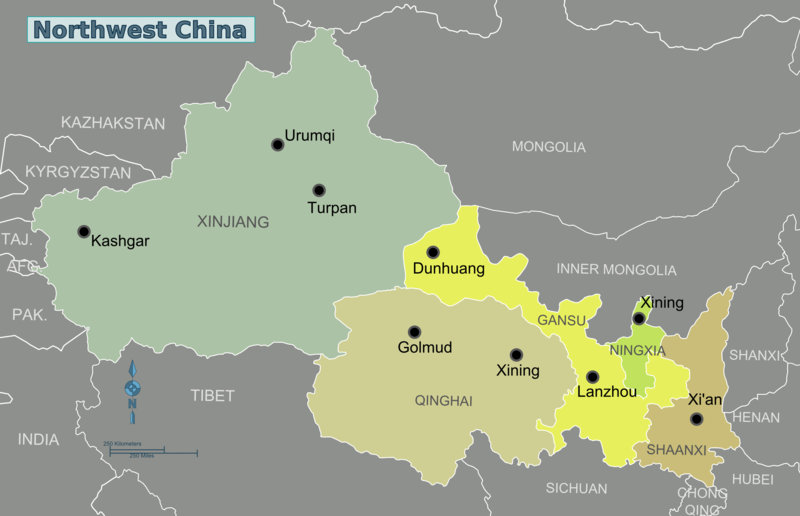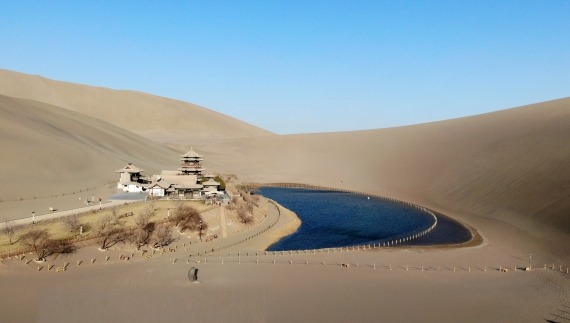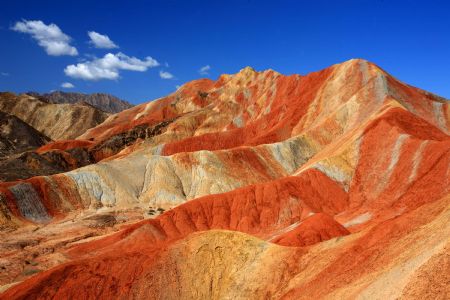Read more about
Lanzhou Lanzhou.Northwest China
North West China was historically a border region with the beginning of the ancient Silk Road, much desert terrain, and mainly Muslim inhabitants including some nomads and rather fierce tribal groups.

The Northwest China region is one of the cradles of Chinese civilisation. To the east of the region, Shaanxi is home to the fossil remains of Lantian Man (primitive man from 5-6 million years ago), and more notably the 8000 Terracotta Warriors of Emperor Qin Shi Huang in Xi’an, buried with the emperor in 210–209 BCE and whose purpose was to protect the emperor in his afterlife. Discovered in 1974, the Terracotta Warriors are a UNESCO World Heritage Site.
North West China has always had strong Chinese influences, though at times there were also independent kingdoms in the area. Over the past hundred years there has been considerable migration by Han Chinese; they are now the largest ethnic group in most areas. Today it is a rapidly growing region, though still less developed than coastal areas.
Northwest China

|
| |
Regions of Northwest China
Tourism across the Northwest focuses on the Silk Road, a series of historic towns and ruins running from Xi’an in Shaanxi, through Ningxia, Gansu and Xinjiang, and into Central Asia. The Northwest also offers opportunities to enjoy China’s last great wildernesses – the grasslands, mountains, lakes and deserts of the interior – far from the teeming population centres of the east. Gansu, the historical periphery of ancient China, is a rugged region of high peaks and desert, spliced from east to west by the Hexi Corridor, historically the only road from China to the West, still marked along its length by the Great Wall – terminating magnificently at the fortress of Jiayuguan – and a string of Silk Road towns culminating in Dunhuang, with its fabulous Buddhist cave art.
Travel Northwest China

Travel can be hard going, with enormous distances and an unforgiving climate. Winter is particularly severe, with average temperatures as low as -30°C in Qinghai and Xinjiang. Conversely, in summer, Turpan is China’s hottest city, with temperatures exceeding 40°C. Despite the rugged terrain and the great expanses, however, facilities for visitors have developed considerably in recent years. The rail network has been expanded, roads improved, and new airports constructed. Finally there is the possibility of travel between China and its Central Asian neighbours – Kazakhstan, Kyrgyzstan and Pakistan are all connected by road or rail from Xinjiang.
Gansu Province, in northwestern China, is about the same size as California, with a population of about 26 million people. Most of its inhabitants are Han Chinese, with some ethnic Hui and Tibetans. Gansu’s diverse landscapes include parts of the Gobi Desert, the Yellow River, numerous mountain formations, and remnants of the Silk Road and the Great Wall of China. The mostly arid lands range in elevation from about 3,000 feet above sea level to mountains more than 19,000 feet tall.
Highest railway in the world

Qinghai, the remote borderland plateau between Tibet and China proper, has
monasteries, mountains, the colossal Qinghai Lake and a route to Tibet via the
highest railway in the world. Qinghai is also the source of China’s greatest
rivers: the Yellow, Yangzi and Mekong rivers all originate in the mountains
here.
Guarding China’s westernmost passes is Xinjiang, where China ends and
Central Asia – once known as Chinese Turkestan – begins; a vast, isolated
region of searing deserts and snowy mountains, formerly the most arduous section
of the Silk Road. Here Turkic Uyghurs outnumber Han Chinese, mosques trade
places with temples and lamb kebabs replace steamed dumplings. Highlights
include the desert town of Turpan and, in the far west, fabled Kashgar, a city
that until recent decades few Westerners had ever reached.
See ratings  af Northwest China , Do you have rice or praise for this Bed and Breakfast, Write your review
af Northwest China , Do you have rice or praise for this Bed and Breakfast, Write your review 